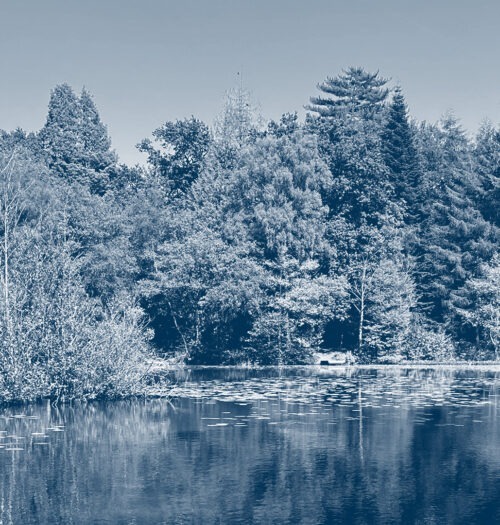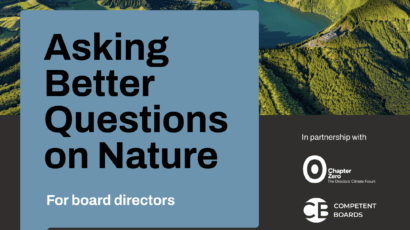
What makes boards move on nature?
I see a big contrast between boards’ understanding of greenhouse gas emissions and their understanding of the risk of nature and biodiversity collapse. Most large companies now track their greenhouse gas emissions and have published their plans to reduce those emissions, as well as the mechanisms they will use to do so. The existence of plans enables boards to discuss their robustness and pace, their cost and their implications for competitive advantage (or disadvantage).
Boards’ discussion of the nature imperative, the biodiversity imperative, is far behind that. I think that the focus on climate change has created the assumption in some people’s minds that climate change is the only reason for the decline in biodiversity; and that if you solve for climate change, you solve for nature.
That is understandable, because climate change is having a substantial impact on nature. But it is also because the climate story is simpler: it is essentially about a single villain, i.e. greenhouse gas emissions; and the impact of those emissions is equal, no matter where in the world they are emitted.
That is not true of ‘nature’: in its narrowest definition, we are dealing with hundreds of thousands of species of creatures and living things other than ourselves, and all of those species interact with each other and with us, and with their local environment, in complex and subtle ways. So, although everyone would probably agree that more nature is ‘good’, there isn’t a single hero, as it were, there isn’t a single measure that captures what good looks like.
Why it matters
Boards – people – often forget that nature is vitally important economically: recent studies have highlighted the economic importance of nature, and all come to the same conclusion: nature is hugely valuable. Nature provides a range of products and services for free: the estimates are that nature accounts for half of all global value added, so that is about $50tr. Nature’s decline will cost us dear.
But those studies are not widely read, and some of them slip into a jargon that ‘denaturises’ nature: for example, the term ‘ecosystem services’ is one well-meaning term, which refers to the fact that plants grow, fish and animals grow, providing us with food and medicines and textiles and building materials, to name a few: we make potato chips but we do not make the actual potatoes. Nature does that for us, in a biochemical dance of great complexity. We make cotton fabric, but we do not make cotton bolls (the cotton plant fruits) – nature does that for us.
It refers to natural pollination of plants so that they produce fruit, done for free by a huge range of insects, birds, moths, bats – creatures on which we typically place no value at all. It refers to the water cycle, and the regulation of the soil by insects and fungi and small mammals; and to the cultural and recreational benefits to us of being in nature.
Millions of years of evolution have created a complex interaction between hundreds of thousands of different species – and our actions over the past 80 years have caused an Armageddon. Most studies show a rapid collapse in most creatures and plant species, in most places in the world.
The collapse is not because of climate change – it is because we have cleared habitats to facilitate monoculture intensive farming, or mining or building, on land that was previously wild.
These are pretty basic concepts, that we all learned in primary school – but it is easy to forget them when we are thinking about economic decisions, in businesses that may not have any direct dependency on other living things. And so the discussions on nature become sterile, and opaque, making real engagement difficult.
What good looks like
I think that everyone in an organisation – from the board down – can benefit from reflecting on some aspects of nature regularly, whether that is facilitated by outsiders or by knowledgeable insiders. Staff really welcome being reminded of nature’s power and how it actually works, with anecdotes relevant to the company and to their lives.
And even while you are thinking big – about distant palm oil plantations for example – there are lots of things that you can do for almost every building you own, and for the land it sits on, to make it more nature-friendly. As Chair of the Eden Project, I was delighted to attend the recent relaunch of Middle Dock in Canary Wharf as Eden Dock by the Canary Wharf Group.
It is an urban oasis in the heart of the Wharf, designed to attract insects and birds and small mammals, while creating more opportunities for people to enjoy nature.
Most companies could probably do similar with their head offices and their distribution points and even their factories. It may have a small impact compared with the more strategic steps required to handle global deforestation but initiatives that engage staff and customers on the subject are always a good idea. And more importantly, they will make a difference to local wildlife.



